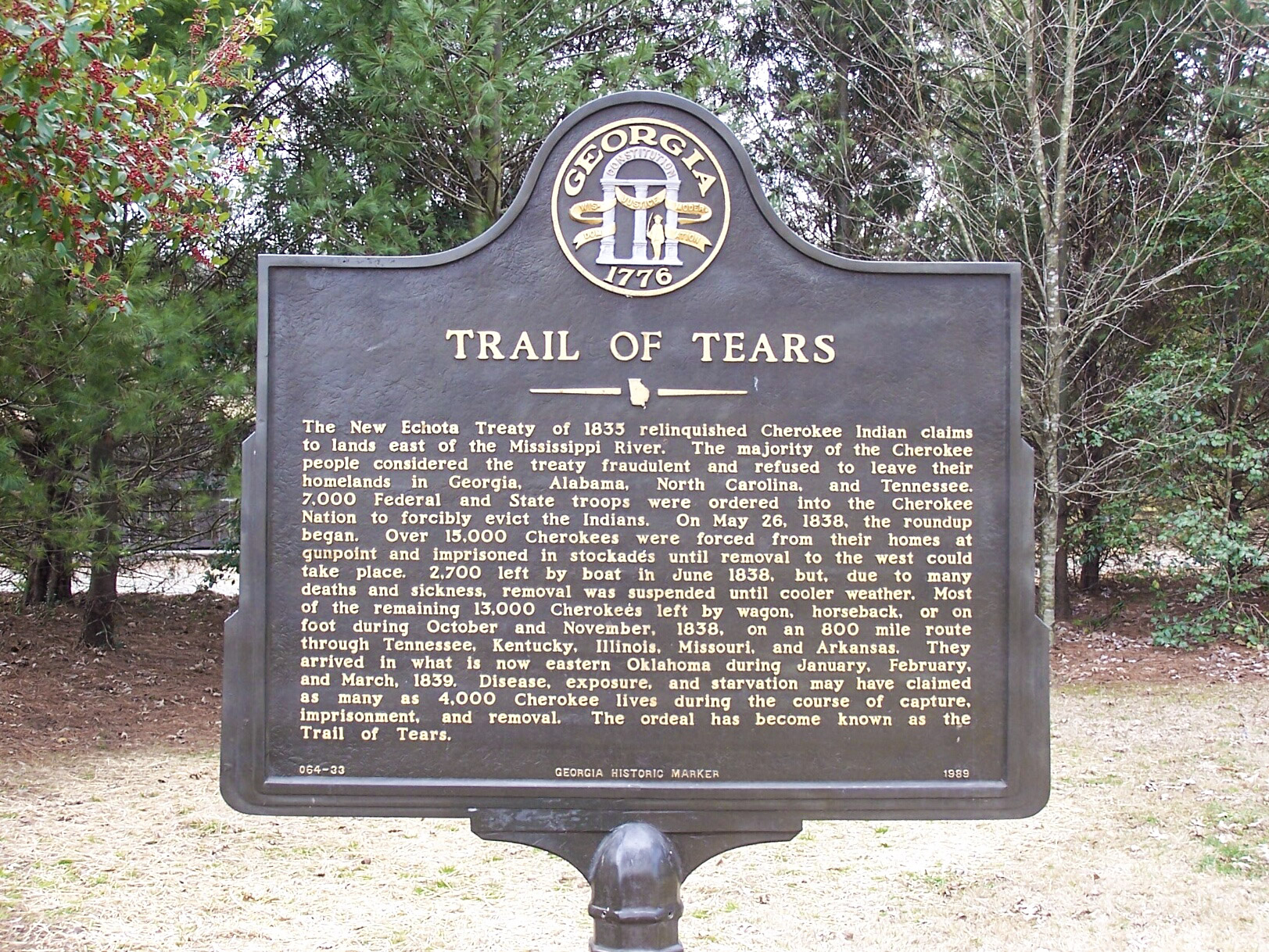Indianz.Com >
News > Chuck Hoskin: Cherokee Nation builds a better future through education
 A Trail of Tears historical marker in Georgia. Photo: J. Stephen Conn
A Trail of Tears historical marker in Georgia. Photo: J. Stephen Conn
Native history is essential to any successful public education curriculum
Monday, February 21, 2022
By Principal Chief Chuck Hoskin Jr.
Cherokee Nation
Recently an online school in Georgia assigned a disturbing writing prompt. The school asked students to theoretically argue why
removing the Cherokee people from their homelands on the
Trail of Tears would “help the United States grow and prosper.”
It showed an incredibly shortsighted approach to history, but fortunately we were able to correct it after talking with the school’s administrators. We secured a promise from them to learn more about Native American history and to do better. For our part, we committed to provide educational resources and expertise going forward. We achieved all of this because both the school, and Cherokee Nation, were willing to sit down, listen to each other and reach a genuine understanding.
The end result was a positive step forward in the teaching of accurate Native American history. Still, in too many public school curriculums, the history of America largely begins with European colonies. Our great societies prior to contact are largely ignored, and the painful history of removal isn’t treated with respect. As a country, we should shift the timeframe and protagonists of our shared history.
ᏣᎳᎩ: Wherever We Are, 2022 Cherokee Freedmen EditionCitizens of the Cherokee Nation bought, owned, and sold enslaved Africans as early as 1755. As the Cherokee Nation was forced from their homelands in the 1830s, Cherokees brought enslaved Africans with them to Indian Territory, and by 1861, the Cherokee held about 4,000 enslaved people. Finally, in 1866, the Cherokee Nation signed a treaty and promised to permanently end slavery and grant former slaves all the rights of native Cherokees. The tribal government lived up to the treaty promises in many ways until the 20th century.
But after reorganization of the tribal government in the 1970s, Freedmen and their descendants were denied their rights. Thanks to the tireless work of advocates, historians, and leaders, Cherokee Freedmen are now able to exercise the full tribal citizenship status they deserve. In 2017, a U.S. Federal District Court ruled in their favor and upheld their citizenship rights. Today, our tribal leadership is proud to stand with Cherokees of Freedmen descent.
OsiyoTV Host and Executive Producer Jennifer Loren will host this event, which will also feature remarks from Principal Chief Chuck Hoskin Jr., Deputy Principal Chief Bryan Warner, and special guests, including Cherokee historian Catherine Foreman Gray and trailblazing Freedmen leader Marilyn Vann, President of the Descendants of the Freedmen of the Five Civilized Tribes Association and the first person with Freedmen status to hold a government position with the Cherokee Nation since the 19th century.
#CherokeeWhereverWeAre
Posted by Cherokee Nation on Saturday, February 19, 2022
Georgia was the Cherokee people’s home before European contact. Although no tribes are present in Georgia today, more than 1,700 Cherokee citizens are currently living there.
In the
1832 Worcester v. Georgia decision, the U.S. Supreme Court ruled that Cherokee Nation is sovereign and not subject to the laws of Georgia. Despite the Supreme Court ruling, the state of Georgia continued pressure to force us from our homes, and President Andrew Jackson eventually signed the Indian Removal Act. The military put us in stockades and forced our ancestors to walk thousands of miles to Indian Territory in harsh winter conditions. This Trail of Tears killed upwards of 4,000 Cherokees, including many elders and children.
Our Cherokee ancestors who survived this atrocity rebuilt their lives on our reservation in northeast Oklahoma. The Cherokee people suffered greatly, but we never surrendered our sovereignty. This history contains important lessons for our lives today, but many textbooks still do not do it justice. We owe it to our youth and to our Cherokee ancestors to have these conversations.
Georgia is not alone in needing to improve the teaching of history. Other state education curriculums are lacking substantive materials, and some even debate reducing Native history lessons. Exposure to Cherokee history and Native history in America helps both Native and non-Native youth better understand the roots of our country and appreciate everyone’s culture.
Given an opportunity to learn, I think most young minds are curious and able to process difficult subjects. To respect our youth and honor our ancestors, Cherokee Nation will continue to offer meaningful dialogue and resources on our tribe and history to any student, teacher or school administration that needs them. By improving our appreciation of history, we build a better future.
Chuck Hoskin Jr.
is the 18th elected Principal Chief of the Cherokee Nation, the largest Indian
tribe in the United States. He is only the second elected Principal Chief of the
Cherokee Nation from Vinita, the first being Thomas Buffington, who served from
1899-1903. Prior to being elected Principal Chief, Hoskin served as the tribe’s
Secretary of State. He also formerly served as a member of the Council of the
Cherokee Nation, representing District 11 for six years.
